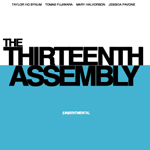|
|
 |
Dusted Reviews
Artist: The Thirteenth Assembly Album: (un)sentimental Label: Important Review date: Mar. 31, 2009 |

|
|
|
 |
Break this quartet of old pals down and you get at least three already extant bands (the duo of brass-man Taylor Ho Bynum and drummer Tomas Fujiwara, another of violist Jessica Pavone and guitarist Mary Halvorson, and the Taylor Ho Bynum Trio), as well as links to a host of other outfits by the members or luminaries like Joe Morris and Anthony Braxton. All that common experience pays off in the way they play together; their execution of ensemble passages is unfailingly spot-on, and they have a knack for detailed and apropos framing of each other’s solo turns. They also share a musical omnivorousness that will likely resonate with your average Dusted reader. Their publicity blurb proclaims their shared willingness to take cues from the AACM, Morton Feldman, Otis Redding and the Melvins, and over the course of nine tunes they take on swinging jazz, atomized improvisation, bracing chamber music and stomping rock.
The Assembly is great at transitioning between genres within a tune, but their facility with these styles varies in ways that make this a record of swell bits rather than a cohesive or convincing whole. They’re gripping while negotiating the multi-segmented structure of Fujiwara’s “Chantal,” which jumps from stop-starts into to a breakneck run through a caffeinated Latin groove full of hairpin turns; a marvelously wigged-out Halvorson solo resolves smoothly into pensive balladry. Pavone’s “Army of Strangers” may not make you forget “Flashlight,” but it is funky enough to induce bobs, even when the strings are plucking interval leaps that would quicken Eric Dolphy’s pulse.
Things only go wrong when they rock out. It’s not that they can’t rock at all; Fujiwara has no trouble hitting it hard, and Halvorson can muster a satisfyingly harsh, distorted tone. They’re just a little too busy and music-schooly about it. The same gravitation to complexity that keeps thing interesting elsewhere just gets in the way when they tread heavily on “Pinched,” so that it’s a relief when the crunching rhythm drops out for a quiet exchange between Pavone’s bright harmonics and Bynum’s acid gargling. Which goes to show, just because you can do play anything doesn’t mean that you should.
By Bill Meyer
|







